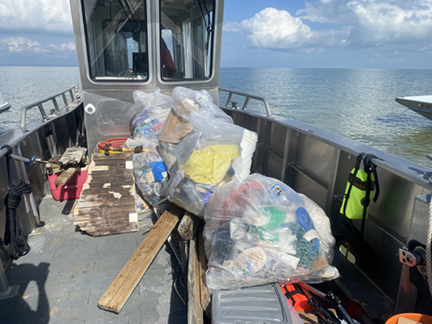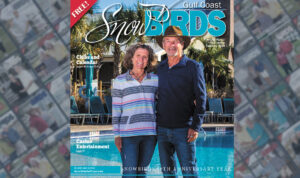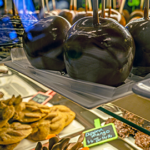
Gulf Islands National Seashore is partnering with Mississippi State University (MSU) Coastal Research and Extension Center to remove marine debris from barrier islands in Mississippi.
The partnership will restore and conserve native habitats on federally managed lands through marine debris cleanup events over the next three years (April through October pending weather). MSU administers the Mississippi Coastal Cleanup Program, and that program will be the lead for outreach to educate the public on marine debris prevention and to recruit volunteers.
Each cleanup will target small to medium-sized debris collection and removal from the National Park Service-managed islands (Horn, Petit Bois, West Petit Bois, Cat, and Ship Island). Additionally, data will be gathered for future planning and research purposes.
“Cleaning up marine debris doesn’t happen overnight,” said Elizabeth Shadle, Gulf Islands National Seashore biologist and project manager. “In remote areas, such as our barrier islands, it requires a lot of planning and effort to not only collect marine debris, but to also transport it off the islands to approved dump areas. Over the years we have removed small amounts of marine debris, however never on the scale we are now planning. We are excited about this partnership.”
Shadle said this project will allow the park to complete the following:
- Remove much larger quantities of marine debris from the barrier islands.
- Educate the public on why marine debris is such a problem.
- Help visitors become more aware of their part in nature and what they can to do help further protect the islands.
This project will positively impact the island habitats for numerous species, including endangered and threatened species such as the snowy plover and loggerhead sea turtle. Marine debris removal also will increase the enjoyment of visitors on remote beach areas.
For this project, marine debris is categorized as any solid man-made material that does not belong in the water or on the islands. It arrives on the islands from a range of sources, including visitors on the islands, mainland sources, offshore oil rigs and services, commercial and recreational activities, as well as debris generated by hurricanes and storms.
Marine debris is harmful to our environment as it negatively impacts wildlife, often animals will get caught in old fishing gear or ingest plastics leading to death. Debris also poses health and safety risks to visitors on the beach, as well as to boaters because it can be difficult to see in the water, causing damage when hit.
Gulf Islands National Seashore and MSU Coastal Cleanup Program hosted a trial event on October 30, 2023, on Horn Island. In just a few hours, 25 volunteers collected 607.5 pounds of marine debris within a two-mile distance. The debris took two small boats to transport back to the mainland.
Be on the lookout for future clean-up events on the barrier islands and remember you can help in small ways. Always try to reduce, reuse, and recycle your waste to help keep Gulf Islands National Seashore a beautiful destination for humans and wildlife.
For more information, please follow the park’s social media accounts or visit http://coastalcleanup.extension.msstate.edu/ .










